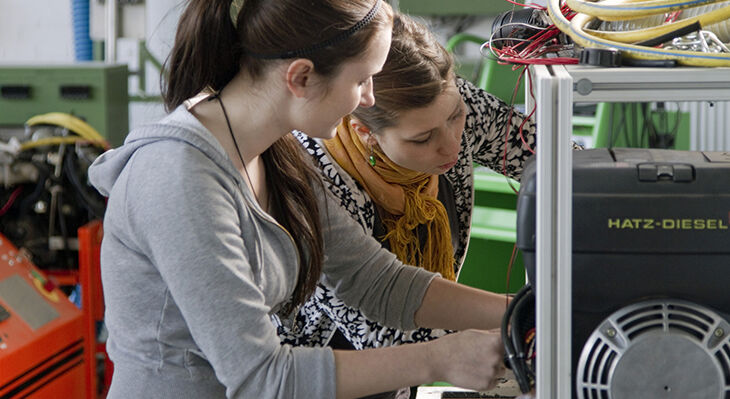Young people study in the company and at school
Young people study in the company and at school
The dual system, the central element of the German VET system, is called “dual” because training takes place at two learning venues; in the company and at the vocational school. Apprentices are employed during the apprenticeship by the company.
The dual system looks back to a history of more than 100 years. It is embedded in German society and characterized by a strong commitment of many groups of German society as there are the state and the federal states, the industry, the companies and the social partners.
What does dual training mean?
Each year, around half of Germany’s school leavers opt for this type of vocational education and training. Learning takes place at two venues – the company and the vocational school. This means that trainees/apprentices are employees and pupils/students at the same time. They conclude a training contract with a company, where they undergo training in one of more than 300 training occupations (skills areas) recognised in accordance with the Vocational Training Act (BBiG) or the Crafts and Trades Regulation Code (HwO).
Depending on the occupation, duration of training is between two and three and a half years. Training may also be completed on a part-time basis. Apart from the provison that mandatory full-time schooling must have been concluded, no further prior school learning requirements apply in respect of entry to dual training. Apprentices receive a training allowance from the employer, i.e. they get paid for their apprenticeship.
A final exam which is performed by the chambers completes the apprenticeship. Upon passing the final examination, apprentices receive a chamber certificate (or a journeyman certificate in the case of a craft trades occupation) to document that training has been successfully completed. This certifies that they are in possession of employability skills in one of the state-recognised occupations.
The expertise of teaching staff at the vocational school and of qualified and certified company-based trainers plays a major role in securing the quality of dual training.The combination of practice and theory which forms the basis of the dual system of vocational education and training in Germany is held in high international regard.
This part of the VET system in Germany is based on a cooperation between state, private sector and social partners (Link to stakeholders)
What role does BIBB play in the German VET System?
The Federal Institute for Vocational Education and Training (BIBB) does research on vocational education and training and plays a major role in the further development of the German (dual) VET system.
The BIBB...
- contributes to scientific research in VET
- prepares the development of training regulations for in-company training within the dual system
- prepares and cares for the "Register of the Recognised Training Occupations"
- prepares the VET Data Report Germany
- prepares surveys and statistics on VET topics
- promotes VET programmes and their scientific evaluation
- contributes to international collaboration in VET
- promotes inter-company vocational training centres (ÜBS)
- advises policy makers
Sources used for this page:
-
1
German Federal Ministry of Education and Research (BMBF) (ed): "Dual vocational education and training made visible", Bonn 2017. p. 9-10, 31-37.
-
2
Hippach-Schneider, Ute; Huismann, Adrienne: "Germany - VET in Europe - 2016 Country Report". Published by BIBB in the context of ReferNet Country reports by CEDEFOP. Bonn 2016.
-
3
European Centre for the Development of Vocational Training (CEDEFOP): "Spotlight on VET Germany". Thessaloniki 2017.
